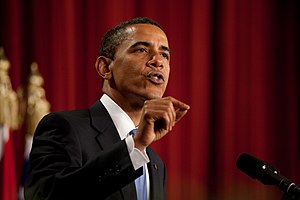| President Barack Obama speaks at Cairo University. Public domain photo. Photo credit: Wikipedia |
Commentary
Daniel Halper reported (Jun 24, 2012) the White House statement given by Press Secretary Jay Carney to convey President Obama's formal congratulations on the victory of the new president of Egypt, Dr. Mohamed Morsi.These words appear in the statement's middle paragraph:
...We believe in the importance of the new Egyptian government
upholding universal values, and respecting the rights of all Egyptian
citizens – including women and religious minorities such as Coptic
Christians. --Jay Carney/The Weekly Standard
President Obama did well to address legitimate concerns for the welfare and safety of women and minorities and to name the largest Christian group specifically. One looks to see if the new Egyptian leaders include all, evangelical and reformed Christians, in their promise of protections and rights. All of this will reassure nervous minorities and women otherwise likely to be persecuted.
In the past, Egyptian Christians have been persecuted in random acts, but protected, in general, by the Mubarak regime. Clearly, all Egyptian minorities--Christians and other non-Muslims, including former Muslims, and other minorities--should have full legal rights and protections in the new Egyptian form of democracy. That is especially basic for Egypt as it begins its own way in what it claims to be determined to do.
In the past, Egyptian Christians have been persecuted in random acts, but protected, in general, by the Mubarak regime. Clearly, all Egyptian minorities--Christians and other non-Muslims, including former Muslims, and other minorities--should have full legal rights and protections in the new Egyptian form of democracy. That is especially basic for Egypt as it begins its own way in what it claims to be determined to do.
One of the largest groups of Coptic Christians lives in Fairfax, Virginia, about an hour's drive from my home in Maryland. I learned this from The Washington Post (July 2, 2012, Metro section B, 'Disaster is coming very soon,' by Pamela Constable). Christians in Fairfax are fearful for their friends and relatives in Egypt, many of whom hope to leave Egypt as soon as possible, due to fears of more persecution.
The Washington Post article reported that after the election a Christian woman was harassed in her town in Egypt when making an Internet payment. A clerk on duty said, "Next time come back with your head covered. Your time is over" (page B1, Wash. Post).
Claims of democracy set down constructive challenges and change for all leaders in Egypt, especially those of the Muslim Brotherhood. Their Muslim brothers in the U. S., as it turns out, have religious freedoms under law in the U. S., where they are a minority religious group.
The Washington Post article reported that after the election a Christian woman was harassed in her town in Egypt when making an Internet payment. A clerk on duty said, "Next time come back with your head covered. Your time is over" (page B1, Wash. Post).
Claims of democracy set down constructive challenges and change for all leaders in Egypt, especially those of the Muslim Brotherhood. Their Muslim brothers in the U. S., as it turns out, have religious freedoms under law in the U. S., where they are a minority religious group.
Clearly, the new president of Egypt will need to put to shame attitudes of aggressively intolerant and extremist groups. He is expected to lead and insist on radical changes for the better of all people of Egypt. Many believe that many Muslims want this too and should not fear speaking out and living their beliefs on basic rights of safety for all citizens.
The U. S. President and State Department, as well as the U. S. Congress, should follow events carefully, using every intelligence means possible, and letting no time go by when or if strong response might be needed. Determined statements by U. S. spokespersons must be followed by necessary actions.
Similarly, UN statements, if not already forthcoming, should make clear that the issue of protected minority and religious freedoms are at the top of democratic agenda.
The U. S. and the UN need to prepare "what if" scenarios and be ready to cut off aid swiftly, the millions the taxpayers of the U. S. give to Egypt. Any "good works" done through U. S. aid are negated whenever the U. S. is weak on religious rights.
Copyright (c)2012 Opinari Writers







No comments:
Post a Comment